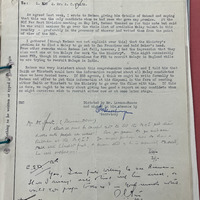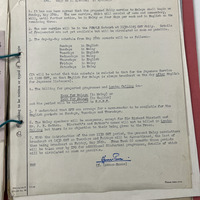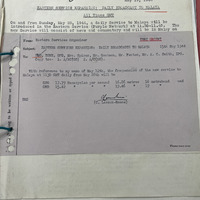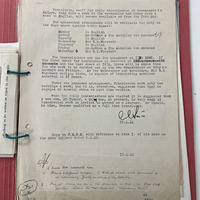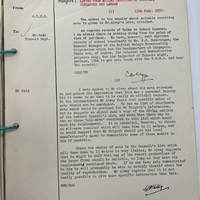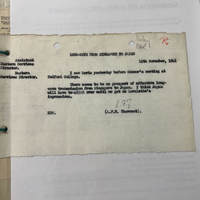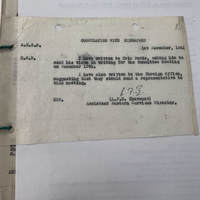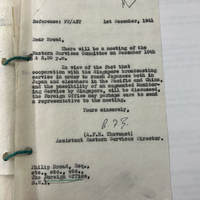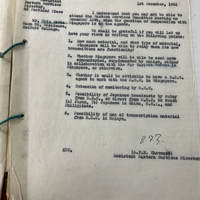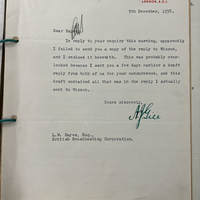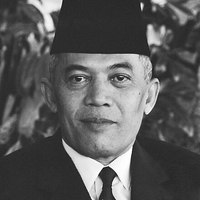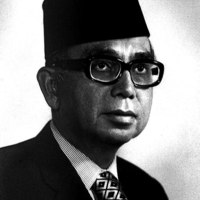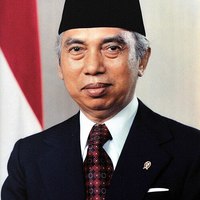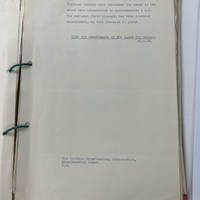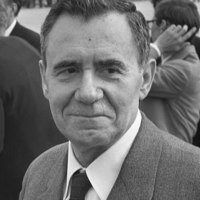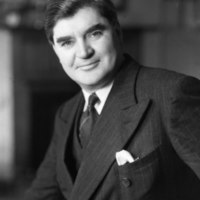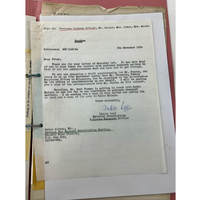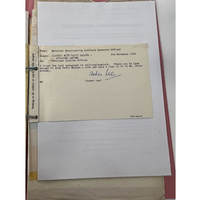Search
787 items
-
The letter stated that the Ministry is looking for one or two Malay staff to work in England. Redman also suggested a comprehensive vetting process in finding a candidate. More »Message
-
The letter lists down the new daily schedule of for the Malayan Broadcasts, dividing the week between English and Malay broadcasts. They are also to add an 11:30 GMT broadcast period. More »Article
-
The telegram lists down the new frequencies addes, referencing the Memo from May 12, 1944 regarding the expansion of the breadcast hours More »Message
-
The memo states the schedule for the translation staff who are to work two mornings a week, and will be put on special rates as they will be considered as part time employees. More »Article
-
A.D.E.S states that Mr. Alway has no list or specific short-wave apparatus that can be used for demonstration at schools but states that they are free to use an all-wave reciever, to be demonstrated by the manufacturer. More »Message
-
Thavenot informs receiver that there are no current plans for long wave transmission from Singapore to Japan. More »Message
-
Thavenot informs receiver of his request from Mr. Davis for points to be brought up on a meeting to be held. As well as informing the receiver of his request to the foreign office for a representative. More »Message
-
Sender informs receiver that the meeting happening on the 10th of December will be about the cooperation with the Singapore Broadcasting Services in order to reach Japan and elsewhere in the Pacific and China. More »Message
-
Sender asked receiver to review following points to be discussed on the 10th of December during the Eastern Service Committee meeting as receiver may not be able to attend. More »Message
-
Sender re attatches a reply of his to V.H Winston's letter. More »Message
-
Abdul Haris Nasution (Old Spelling: Abdoel Haris Nasution; 3 December 1918 – 6 September 2000) was a high-ranking Indonesian general and politician. He served in the military during the Indonesian National Revolution and he remained in the military during the subsequent turmoil of the Parliamentary democracy and Guided Democracy. Following the fall of President Sukarno from power, he became the Speaker of the People's Consultative Assembly under President Suharto. Born into a Batak Muslim family, in the village of Hutapungkut, Dutch East Indies, he studied teaching and enrolled at a military academy in Bandung. He became a member of the Royal Netherlands East Indies Army, but following the Japanese invasion, he joined the Defenders of the Homeland. Following the proclamation of independence, he enlisted in the fledgling Indonesian armed forces and fought during the Indonesian National Revolution. In 1946, he was appointed commander of the Siliwangi Division, the guerrilla unit operating in West Java. After the end of the national revolution, he was appointed Chief of Staff of the army, until he was suspended for his involvement in the 17 October affair. He was reappointed to the position in 1955. In 1965, an attempted coup occurred, later officially blamed on the Communist Party of Indonesia. Nasution's house was attacked, and his daughter was killed, but he managed to escape by scaling a wall and hiding in the Iraqi ambassador's residence. In the following political turmoil, he assisted in the rise of President Suharto and was appointed Speaker of the People's Consultative Assembly. He had a falling out with Suharto, who saw him as a rival, and he was pushed out of power in 1971. Once he was removed from positions of power, Nasution developed into a political opponent of Suharto's New Order Regime, though he and Suharto began to reconcile in the 1990s. He died on 6 September 2000 in Jakarta, after suffering a stroke and going into a coma. His body was interred at Kalibata Heroes Cemetery. (Wikipedia) More »Person
-
Tun Haji Abdul Razak bin Dato' Hussein (Jawi: عبد الرزاق بن حسين; 11 March 1922 – 14 January 1976) was a Malaysian lawyer and politician who served as the second prime minister of Malaysia from 1970 until his death in 1976. He also served as the first deputy prime minister of Malaysia from 1957 to 1970. He is referred to as the Father of Development (Bapa Pembangunan). Abdul Razak was the figure responsible for setting up Barisan Nasional (BN), which is the ruling coalition of political parties that held power in Malaysia. Abdul Razak is also renowned for launching the Malaysian New Economic Policy (MNEP). His eldest son, Najib Razak, became the sixth prime minister in 2009; Najib is the first prime minister of Malaysia to be a descendant of a former prime minister. (Wikipedia) More »Person
-
Adam Malik Batubara (22 July 1917 – 5 September 1984) was an Indonesian politician, diplomat, and journalist, who served as the third vice president of Indonesia from 1978 until 1983, under President Suharto. Previously, he served in a number of diplomatic and governmental positions, including Speaker of the People's Consultative Assembly from 1977 to 1978, Speaker of the People's Representative Council from 1977 to 1978, Foreign Minister of Indonesia from 1966 until 1977, and president of the United Nations General Assembly from 1971 until 1972. Born in Pematangsiantar, North Sumatra, on 22 July 1917. He grew up relatively comfortably, and was educated at the Hollandsch-Inlandsche School (HIS). He pioneered the establishment of the Antara news agency in 1937, and was an active supporter of Indonesian independence, being put in prison for disobeying the Colonial Government's ban on political assemblies. Towards independence on 17 August 1945, he was involved in the Rengasdengklok incident and the Proclamation of Independence. Following independence, he served in a number of government positions, including as a member of the People's Representative Council (DPR) and as the Minister for Trade. He continued to serve in government, following the fall of Sukarno. Being appointed Foreign Minister in 1966. In 1977, he was elected as Speaker of both the People's Representative Council (DPR) People's Consultative Assembly (MPR). In 1978, he was elected as the 3rd Vice President of the Republic of Indonesia replacing Sri Sultan Hamengkubuwono IX who unexpectedly stated that he was not willing to be nominated again. As vice president, he criticized the government for its increasing feudalism-like structure and rampant corruption, referring it as an "epidemic." In 1983, Malik's term as Vice-President came to an end and he was replaced by Umar Wirahadikusumah. Adam Malik died on 5 September 1984, in Bandung, due to liver cancer. His body was interred in the Kalibata Heroes Cemetery. Later, his wife and children established the Adam Malik Museum. He was designated as a National Hero on 6 November 1998 based on Presidential Decree No. 107/TK/1998. (Wikipedia) More »Person
-
Speech by Louis Mountbatten to British forces in Southeast Asia during WWII. He acknowledges the challenges ahead but assures them of increasing support from home. More »Spoken voice |Topic: Military Conflict |Audio
-
Richard Chubb records a message in Fort Dufferin while awaiting a ceremonial flag-raising. The 19th division has completed a remarkable march, standing on an earth parade ground in faded jungle green attire. Spitfires fly overhead, and soldiers, wearing bush hats, tin helmets, berets, and turbans, stand at attention. The commander arrives, signaling with a bugle. The message is addressed to every man in the 14th army, celebrating the capture of Mandalay and the restoration of the Union Jack over Fort Dufferin. The 33rd Indian corps and 4th corps played a significant role, and Kipling's poem on the road to Mandalay is mentioned, expressing a focus on the journey from Mandalay. More »Spoken voice |Topic: Military Conflict |Audio
-
Adlai Ewing Stevenson II (; February 5, 1900 – July 14, 1965) was an American politician and diplomat who was the United States Ambassador to the United Nations from 1961 until his death in 1965. He previously served as the 31st governor of Illinois from 1949 to 1953 and was the Democratic nominee for president of the United States in 1952 and 1956, losing both elections to Dwight D. Eisenhower in a landslide. Stevenson was the grandson of Adlai Stevenson I, the 23rd vice president of the United States. Raised in Bloomington, Illinois, Stevenson was a member of the Democratic Party. He served in many positions in the federal government during the 1930s and 1940s, including the Agricultural Adjustment Administration, Federal Alcohol Administration, Department of the Navy, and the State Department. In 1945, he served on the committee that created the United Nations, and was a member of the initial U.S. delegations to the UN. In 1948, he was elected governor of Illinois, defeating incumbent governor Dwight H. Green in an upset. As governor, Stevenson reformed the state police, cracked down on illegal gambling, improved the state highways, and attempted to cleanse the state government of corruption. Stevenson also sought, with mixed success, to reform the Illinois state constitution and introduced several crime bills in the state legislature. In the 1952 and 1956 presidential elections, he was chosen as the Democratic nominee for president, but was defeated in a landslide by Republican Dwight D. Eisenhower both times. In 1960, he unsuccessfully sought the Democratic presidential nomination for a third time at the Democratic National Convention. After President John F. Kennedy was elected, he appointed Stevenson as the United States Ambassador to the United Nations. Two major events Stevenson dealt with during his time as UN ambassador were the Bay of Pigs Invasion of Cuba in April 1961 and the Cuban Missile Crisis in October 1962. He was still serving as UN ambassador when he suffered a heart attack during a visit to London in July 14, 1965, later dying that day at the age of 65. He is buried in Evergreen Cemetery in his hometown of Bloomington, Illinois. (Wikipedia) More »Person
-
The sender outlines the increase of wireless receiving station licenses in various locations across Malaya. He also provides information on increases in the power of their short wave transmitters. More »Message
-
In a recent discovery, a collection of religious ritual songs and dances performed in a Temiar long-house has shed light on the shamanic, animistic faith of the community. This traditional music, reportedly given by a tiger spirit to a chief in Ulu Nenggiri in Kelantan, carries a significant message that led his group to establish a new settlement at Ajin, near the border of Cameron Highlands. This remarkable find provides insight into the spiritual beliefs and cultural practices of the Temiar people. More »Music |Topic: Culture |Audio
-
Alan Burgess (1 February 1915 – 10 April 1998) was an English Royal Air Force pilot and author who wrote several biographical and non-fiction books between the 1950s and the 1970s. He wrote biographies of Gladys Aylward, and Flora Sandes, and co-wrote Ingrid Bergman's autobiography. Bergman played Gladys Aylward in the film The Inn of the Sixth Happiness based on Burgess's biography. Having served in the Royal Air Force during World War II, Burgess went on to write The Longest Tunnel: The True Story of World War II's Great Escape, the story of "The Great Escape". (Wikipedia) More »Person
-
Alexander Frederick Douglas-Home, Baron Home of the Hirsel KT, PC (/ˈhjuːm/; 2 July 1903 – 9 October 1995), styled as Lord Dunglass between 1918 and 1951 and the Earl of Home from 1951 until 1963, was a British statesman and Conservative politician who served as Prime Minister of the United Kingdom from 1963 to 1964. He is notable for being the last prime minister to hold office while being a member of the House of Lords, before renouncing his peerage and taking up a seat in the House of Commons for the remainder of his premiership. His reputation, however, rests more on his two stints as Foreign Secretary than on his brief premiership. (Wikipedia) More »Person
-
In the Ulu Nenggiri region of Kelantan, a member of the AlusTemiar community had a dream in which the spirit of the tiger gave him a song while he and his group were clearing a new area for cultivation. The song was a token of peace, as the tiger spirit was amazed and somewhat frightened by the power of the group to fell large trees. The ritual music, rooted in the shamanic and animistic faith of the Temiar people, is performed in long-houses and reflects a connection to the natural world and its spirits. More »Music |Topic: Culture |Audio
-
The third program "America Since the Bomb: The Moon or South-East Asia" dealing with American policies since 1945. The narrator is Edward Ward and the program was written and produced by D.G. Bridson. Inserts were read by Robert Ayres and Murray Kash. The program includes speakers such as William Fulbright, Lyndon B. Johnson, John F. Kennedy, and Adlai Stevenson. The program was recorded on December 7, 1966, and contains material on commercials, BBC discs, and other speakers. More »Spoken voice |Topic: Politics | Military Conflict |Audio
-
Anak Ayam (Zapin): A traditional instrumental Malaysian folk dance in the zapin style, performed by violinist Hamzah Dolmat and his group Rakan2. The performance includes unestablished instrumentation, most likely harmonium, violin, accordion, and percussion. More »Music (Instrumental) |Topic: Culture |Audio
-
Anak Ayam (Zapin) is a traditional instrumental Malaysian folk dance in the zapin style, performed in a popular idiom by violinist Hamzah Dolmat and his group Rakan2. The unestablished instrumentation most likely includes a harmonium, violin, and percussion, with other instruments such as the oud (fretless lute), accordion, and drum also used. The music falls into the categories of popular music, folk songs and music, folk dance music, and world and traditional music, specifically from Asia. The performance was recorded by Radio Malaysia and the BBC Tropical Tapes, with the reel containing 4 minutes and 10 seconds of music. The performers include violinist Hamzah Dolmat and his group Rakan2, as well as an unidentified sound recordist. More »Spoken voice |Topic: Culture |Audio
-
Anak Tiong (Asli): A traditional instrumental Malaysian folk dance in the asli style, performed by violinist Hamzah Dolmat and his group Rakan2. The performance features unestablished instrumentation, most likely harmonium, violin, accordion, and percussion. More »Music (Instrumental) |Topic: Culture |Audio
-
Andrei Andreyevich Gromyko (Russian: Андрей Андреевич Громыко; Belarusian: Андрэй Андрэевіч Грамыка; 18 July [O.S. 5 July] 1909 – 2 July 1989) was a Soviet politician and diplomat during the Cold War. He served as Minister of Foreign Affairs (1957–1985) and as Chairman of the Presidium of the Supreme Soviet (1985–1988). Gromyko was responsible for many top decisions on Soviet foreign policy until he retired in 1988. In the 1940s Western pundits called him Mr Nyet ("Mr No") or "Grim Grom", because of his frequent use of the Soviet veto in the United Nations Security Council.Gromyko's political career started in 1939 in the People's Commissariat for Foreign Affairs (renamed Ministry of Foreign Affairs in 1946). He became the Soviet ambassador to the United States in 1943, leaving that position in 1946 to become the Soviet Permanent Representative to the United Nations in New York. Upon his return to Moscow he became a Deputy Minister of Foreign Affairs and later First Deputy Minister of Foreign Affairs. He went on to become the Soviet ambassador to the United Kingdom in 1952. As Foreign Minister of the Soviet Union, Gromyko was directly involved in deliberations with the Americans during the Cuban Missile Crisis and helped broker a peace treaty ending the 1965 Indo-Pakistani War. Under the leadership of Leonid Brezhnev, he played a central role in the establishment of détente with the United States by negotiating the ABM Treaty, the Partial Nuclear Test Ban Treaty and the SALT I & II among others. When Brezhnev suffered a stroke in 1975 impairing his ability to govern, Gromyko effectively dictated policymaking alongside KGB Chairman Yuri Andropov, Defense Minister Andrei Grechko and Grechko's successor, Marshal Dmitry Ustinov. Even after Brezhnev's death, Gromyko's rigid conservatism and distrust of the West continued to dominate the Soviet Union's foreign policy until Mikhail Gorbachev's rise to power in 1985. Following Gorbachev's election as General Secretary, Gromyko lost his office as foreign minister and was appointed to the largely ceremonial post of Chairman of the Presidium of the Supreme Soviet of the USSR. Subsequently, he retired from political life in 1988, and died the following year in Moscow. (Wikipedia) More »Person
-
Aneurin "Nye" Bevan PC (/əˈnaɪrɪn ˈbɛvən/; Welsh: [aˈnəɨ.rɪn]; 15 November 1897 – 6 July 1960) was a Welsh Labour Party politician, noted for tenure as Minister of Health in Clement Attlee's government in which he spearheaded the creation of the British National Health Service. (Wikipedia) More »Person
-
Asher Lee writes to Peter Albany attempting to liaise on audience research. He notes that his office has drafted a questionnaire to distribute at the British Far East Broadcasting Services office in Singapore. More »Message
-
Asher Lee writes a clarification on his previous letter (Item Designation BBC_507) asking the receiver to copy his letter to Peter Albany More »Message
-
In 1955, Vivian Fuchs, the leader of the Commonwealth Trans-Antarctic Expedition, discussed the qualities he looks for when choosing personnel for expeditions in an interview with Lai Chong Kiat from Sarawak. The interview was broadcast on 'London Calling Asia' More »Spoken voice |Topic: Sport |Audio
-
Recording contains information about the Temiar people and their religious ritual songs and dances, which are performed in a long-house as part of their shamanic, animistic faith. The recording specifically mentions a song given to the shaman, Bah Sain, by the spirit of the wind among the bamboos, which tells the Temiar that the wind in the bamboos is the force that moves the airplanes they see flying in the sky. This information sheds light on the spiritual beliefs and cultural practices of the Temiar tribe from Telom in Pahang. More »Music |Topic: Culture |Audio
Show filters +


